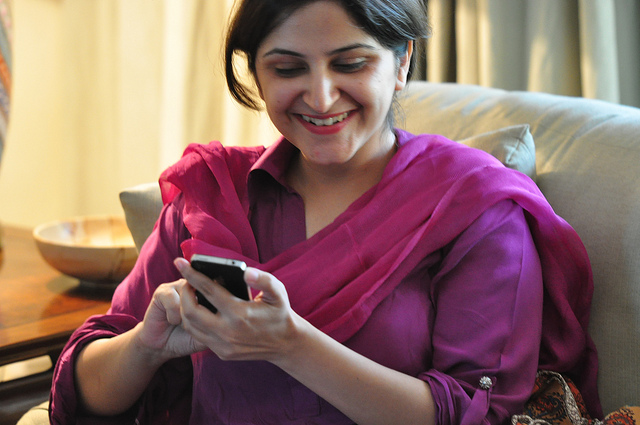Conversational Urdu: بول چال کی اردو Posted by Rachael on Jun 4, 2018 in Uncategorized
When learning a language, especially a South Asian one such as Urdu, it is important to appreciate differences in registers. A register simply refers to a social level of speech, like the formal speech you would use in a term paper or while delivering a presentation at work as opposed to the informal/colloquial speech you use when speaking to your friends or close family members. In South Asian languages such as Urdu, these registers or levels are more pronounced than in English, for example, so that formal speech often sounds very different from بول چال/bolchaal or informal/colloquial speech. As a language learner, you need to know informal syntax (word order) and vocabulary in order to carry on the most common type of conversation: the colloquial, every day variety. Follow along as I examine some common questions and answers that can be heard in a typical Urdu conversation.
Can you help me?
-
آپ/تم میری مدد کر سکتی/سکتے ہیں/ہو؟ (Aap/tum meri madad kar sakti/sakte hain/ho)?
Let’s break down the vocabulary here:
اہم الفاظ (Ahem Alfaaz) / Important Words:
- آپ/aap: The formal version of “you” best used with those who are superior to you socially, such as someone who works above you, someone who is older than you or someone who looks about your age but whom you do not know well. When in doubt about someone you do not know, use آپ/aap. This is considered grammatically plural, even if you’re only speaking to one person. If you wish to indicate more than one person, use the phrase آپ لوگ/aap log (you all/you people).
- تم/tum: The informal version of “you” often used with those you know well, such as friends, family members and those who work alongside you and/or are the same age as you. Wait until you become acquainted with someone in a friendly way before using تم/tum. This is also considered grammatically plural; if you want to indicate numerical plurality, use the phrase تم لوگ/tum log (you all/you people).
- مدد کرنا/madad karnaa: to help. مدد/madad (help) is a feminine noun, and this verb takes the possessive pronoun, so you would say میری مدد/meri madad for “to help me,” تمہاری مدد/tumhaari madad for “to help you (informal)”, ہماری مدد/humaari madad for “to help us” and آپ کی مدد/aap ki madad for “to help you (formal)”, etc.
- سکنا/saknaa: to be able to.
عام جواب (Aam javaab) / Common Responses:
- زرور/zaroor: Of course!, بلکل/bilkul: Absolutely!
- آپ کی/تمہاری مدد کر کے مجھے خوشی ہوگی/aap ki/tumhaari madad kar ke mujhe khushi hogi: I would be happy to help you.
- کتنا وقت لگیگا ؟ / kitnaa vaqt lagegaa? : How long will it take?
- ٹھیک ہے، ایک منٹ / thik hai, ek minute: Okay, just a minute (wait a sec).
- معاف کیجیےٴ/کرو، میں ابھی مصروف/بزی ہوں / maaf kijiye/karo, main abhi masroof/busy huun: Sorry, I’m busy right now. (You can also just say “sorry” in English).
What have you been up to lately?
-
آپ/تم کیا کر رہی/رہے ہیں/ہو حال میں؟
اہم الفاظ (Ahem Alfaaz) / Important Words:
- کیا/kyaa: what. This is a question word—you will notice that all of the question words in Urdu begin with a “k,” such as کدھر/kidhar (in which direction), کہاں/kahaan (where), کیوں/kyon (why), کون/kaun (who) and کب/kab (when). Unlike English, where we usually put question words at the beginning of a sentence, in Urdu the question word appears in the same position as the word it stands for; so, instead of “What are you eating?” (in English, “what,” the question word, appears at the beginning of the sentence), in Urdu you have “تم کیا کھا رہے ہو؟” (Tum kyaa khaa rahe ho / You what eating are?, literally, where “what” appears in the second position, the same place it would be in the answer to this question: میں روتی کھا رہا ہوں / Main roti khaa rahaa huun / Literally: I roti eating am (“roti” or “bread” replaces “kyaa/what” in the second position here). This actually makes asking questions in Urdu easier than English!
- کر رہی/رہے ہیں/ہو/kar rahi/rahe hain/ho: This is the progressive form of the verb کرنا/karnaa=to do. It indicates the -ing verb in English: “I am doing, You are singing, We are reading, etc.” Remember that the auxiliary verb (ہیں, ہو) changes according to whether you’re using آپ or تم.
- حال میں/haal me=recently, lately. Another option is آجکل/aajkal, which means “these days.” Yet a third option is فلحال/filhaal, which means “at the present, for the time being.”
عام جواب (Aam javaab) / Common Responses:
- میں بہت کام کر رہی/رہا ہوں/main bahut kaam kar rahi/rahu huun: I’ve been working a lot.
- عام طور سے میں پڑھای کر رہی/رہا ہوں/aam taur se main parhaai kar rahi/rahaa huun: I’ve been studying most of the time.
- میں بس آرام کر رہی/رہا ہوں/main bas aaraam kar rahi/rahaa huun: I’ve just been relaxing.
- میں گرمیوں کی چھٹیوں کی تیاریاں کر رہی/رہا ہوں/main garmiyon ki chuttiyon ki taiyaariyaan kar rahi/rahaa huun: I’m making arrangements/planning for my summer trip(s).
- کچھ بھی نہیں کر رہی/رہا ہوں/kuch bhi nahin kar rahi/rahaa huun: I’ve been doing absolutely nothing.

Build vocabulary, practice pronunciation, and more with Transparent Language Online. Available anytime, anywhere, on any device.






